#financial transcription services
Text
Corporate and Financial Transcription Services
Corporate and Financial Transcription Services
Finance has been integral to commerce since ancient times, beginning with the bartering systems of old civilisations. As societies evolved, so did financial systems, with the introduction of coinage by the Lydians around 600 BC marking a pivotal development. This was followed by the creation of banks in medieval Italy, providing a more organized…

View On WordPress
0 notes
Text
Enhancing Legal Processes with Skillful Legal Transcription Services
Professional legal transcription elevates legal procedures by accurately converting spoken content, fostering efficiency, collaboration, and informed decision-making.
Visit Us:- https://theamberpost.com/post/elevating-legal-process-through-proficient-legal-transcription-services
1 note
·
View note
Text
How To Help Financial And Market Research Transcription For Business?
Accurately recording opinion research insights is necessary to ensure that these efforts have the maximum potential impact. This is where financial transcription services may help. Transcribing material from opinion research efforts accurately may assist company executives in tracking, recording, and implementing the thoughts and suggestions of their intended audience. You can get the best help in financial and opinion research for business at Spectrascribe.com
Following are the ways to help financial and market research transcription for business
Interpretation of Focus Group Discussions
One of the most common forms of market research is subjective. This approach enables corporate leaders to speak from multiple members of their target audience at one time. Historically, researchers conducted focus group discussions in person, but many of these discussions have been relocated to social media platforms in recent years. As a consequence, these transcripts can save researchers time when scanning through audio or video recordings. Spectrascribe.com transcripts also include speaker annotations, which might assist identify who is speaking. Because focus group discussions rely on the interaction and communication of numerous participants at the same time, this information is frequently crucial.
Transcription of Interviews
One-on-one interviews can also be a useful technique for market research. Transcribing these conversations accurately can assist optimize their value and make it easier for company executives and marketers to capture the perspectives expressed by interview respondents.
Because of the degree of complexity, it can express, our transcription is likely to be the preferred transcription format for interviews. Individual interviews span a wide range of data points, and word-for-word transcription of these interactions makes the material more easily digestible.
Market Research Transcription
Marketers can copy research studies in a variety of ways. Some businesses prefer to use in-house workers to hand transcribe recordings of focus groups, interviews, and other events. Untrained personnel, on the other hand, are prone to make a significant amount of transcribing mistakes. Minor inaccuracies in technical transcribing might make a significant impact and cause misunderstanding during the following talks.
Other companies may outsource market research transcribing to skilled human transcribers to avoid these problems. While these specialists may achieve a high level of precision they are frequently expensive to employ and frequently suffer bandwidth challenges. Large-scale research initiatives are likely to need a significant amount of time and money to finish. As a result, marketers and company executives may find it challenging to scale their marketing operations appropriately.
#financial transcription#market research transcription#financial transcription services#focus group transcription
0 notes
Text
what’s the point of an unofficial transcript if i can’t see it unless i pay to send it to myself anyways?
#college#college is annoying#transcripts#“you can preview your transcript by paying our transcript ordering service to send it to you. no you can’t look at it without paying”#like… if i didn’t have financial aid i’d be paying you motherfuckers 90k a year#you have to charge me to look at my transcript too?
0 notes
Text
considering taking up some part-time work i can do from home to save up some extra money. would just have to look up what's available in german since I'm not 100% sure about my english skills
#rina.txt#i've already found a german transcription service that hires part-timers so maybe i'll try that#i am pretty privileged in that i get financial support from my reasonably well-off grandparents as well as child support from my dad#so i don't have to go to uni AND work#but he will most likely stop paying since i have my bachelors degree now and it's not required/expected anymore#but i still wanna do my master. so. yeah#might also be good for my resume so win-win i guess
0 notes
Note
Other tips for financially abused kids who want to leave:
Most banks will send you a credit card when you apply. You cannot opt out of it. See if you can get it sent somewhere that's not your home, or find a bank that allows you to opt out of getting one (try emailing them to check).
Also: here's a reddit article I found with banks that allow you to opt out of a credit card- (do your own research though-this information could be false or outdated)
https://www.reddit.com/r/personalfinance/comments/deqlx6/how_to_open_a_bank_account_while_hiding_it_from/
(I hear Novo bank allows you to opt out of getting a card. And it's also a business bank. However, a good chunk of the reviews are bad).
Get an account at a bank your family doesn't use, and make sure they don't know about it. Otherwise they could get access to it.
Cashapp can be used as a bank (not recommended bc cashapp isn't as secure as a bank, but it is an option).
You can check how good a bank is by checking nerdwallet and reddit.
You'll need a business bank account-or an account that lets you do business-if you want to freelance (which includes things like transcription). There's an article on nerdwallet about the best business accounts, and another one about accounts you can open without an EIN.
Make sure your bank statements are emailed and not mailed.
There's a bank called Majority which allows people to get accounts without SSN. Most of the reviews I've seen are good, but I still recommend checking the reviews yourself.
Try to get a paypal if you're going to get an online job-a lot of them require a paypal to use their services.
If you don't have proof of address, look for an online-only bank.
^^^
380 notes
·
View notes
Text
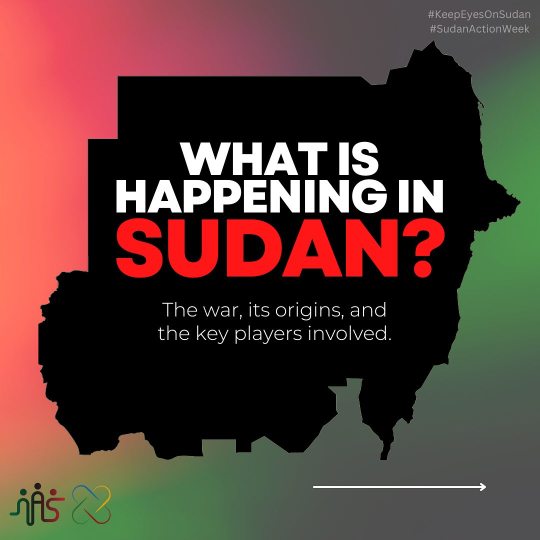
Via NasAlSudan
December 17 2023. #KeepEyesOnSudan #SudanActionWeek
Swipe through to build a foundational understanding of the war, its origins, and the key players involved. For actionable ways to support those in Sudan, check the link in our bio. Stay tuned for more posts this week.

Transcript:
National:
On April 15, a war broke out in Sudan's capital city of Khartoum between the Sudanese Armed Forces (SAF), and a paramilitary group known as the Rapid Support Forces (RSF).
Since then, eight months of conflict has led to major destruction of Khartoum's infrastructure, the most developed region of Sudan, with fighting also spreading to the regions of Darfur in the west and Kordofan in the south.
Civilians in conflict zones have been forcibly displaced, under threat of physical and sexual violence, particularly by the RSF, which has looted, destroyed, and settled in people's homes.
Regional:
In the western region of Darfur, a campaign of ethnic cleansing is being carried out by the RSF targeting the Masalit tribe. Allegations of genocide have been levied against the RSF.
Reports have just emerged that fighting has now spread to Wad Madani in Al Gezira state, which houses nearly 500,000 IDPs from Khartoum.
Key figures:
Abdel Fattah al Burhan Head of SAF
Omar El-Bashir Deposed Dictator of Sudan
Mohamed Dagalo (Hemidti) Head of RSF
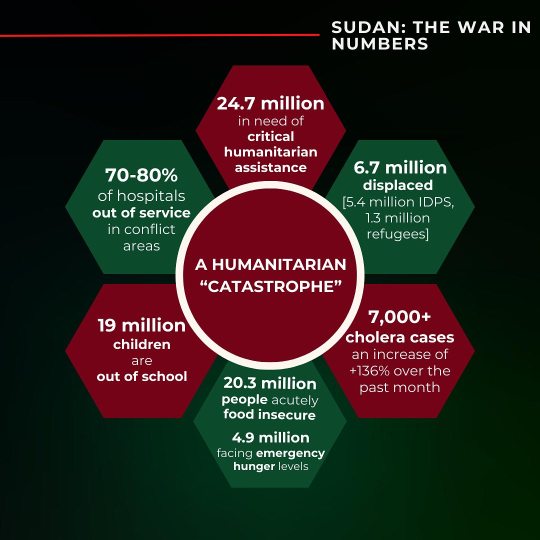
Transcript:
Sudan: the war in numbers
A humanitarian "catastrophe"
24.7 million in need of critical humanitarian assistance
70-80% of hospitals out of service in conflict areas
19 million children are out of school
20.3 million people acutely food insecure. 4.9 million facing emergency hunger levels
6.7 million displaced [5.4 million IDPS, 1.3 million refugees]
7,000+ cholera cases an increase of +136% over the past month
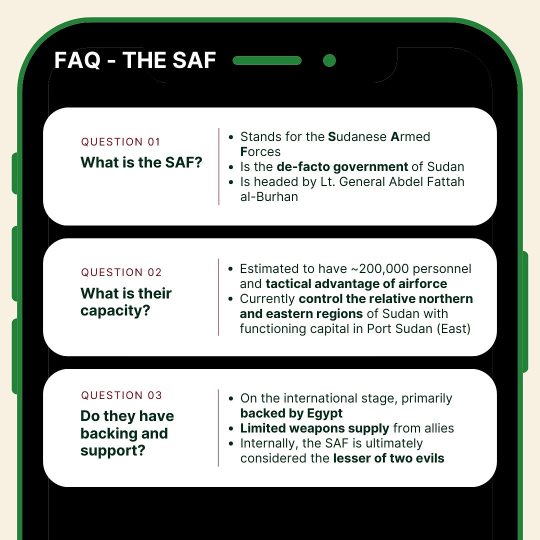
Transcript:
FAQ - THE SAF
QUESTION 01: What is the SAF?
Stands for the Sudanese Armed Forces
Is the de-facto government of Sudan
Is headed by Lt. General Abdel Fattah al-Burhan
QUESTION 02 What is their capacity?
Estimated to have ~200,000 personnel and tactical advantage of airforce
Currently control the relative northern and eastern regions of Sudan with functioning capital in Port Sudan (East)
QUESTION 03 Do they have backing and support?
On the international stage, primarily backed by Egypt
Limited weapons supply from allies
Internally, the SAF is ultimately considered the lesser of two evils
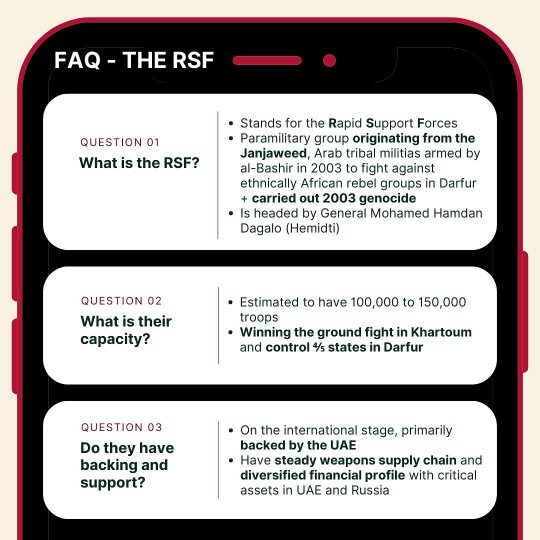
Transcript:
FAQ - THE RSF
QUESTION 01 What is the RSF?
Stands for the Rapid Support Forces
Paramilitary group originating from the Janjaweed, Arab tribal militias armed by al-Bashir in 2003 to fight against ethnically African rebel groups in Darfur + carried out 2003 genocide
Is headed by General Mohamed Hamdan Dagalo (Hemidti)
QUESTION 02 What is their capacity?
Estimated to have 100,000 to 150,000 troops
Winning the ground fight in Khartoum and control 4/5 states in Darfur
QUESTION 03 Do they have backing and support?
On the international stage, primarily backed by the UAE
Have steady weapons supply chain and diversified financial profile with critical assets in UAE and Russia
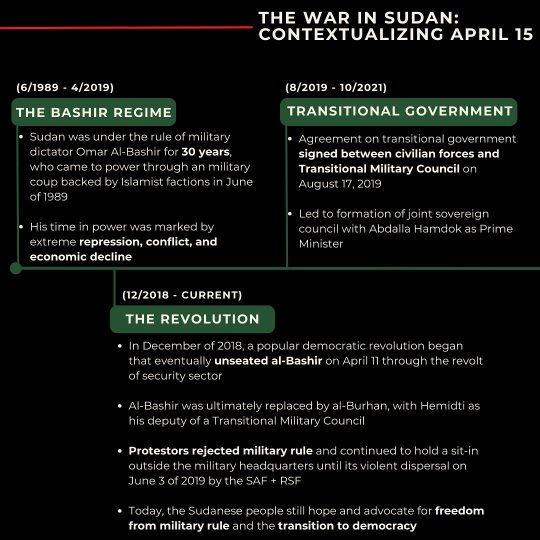
Transcript:
THE WAR IN SUDAN: CONTEXTUALIZING APRIL 15
(6/1989 - 4/2019) THE BASHIR REGIME
Sudan was under the rule of military dictator Omar Al-Bashir for 30 years, who came to power through an military coup backed by Islamist factions in June of 1989
His time in power was marked by extreme repression, conflict, and economic decline
(12/2018 CURRENT) THE REVOLUTION
In December of 2018, a popular democratic revolution began that eventually unseated al-Bashir on April 11 through the revolt of security sector
Al-Bashir was ultimately replaced by al-Burhan, with Hemidti as his deputy of a Transitional Military Council
Protestors rejected military rule and continued to hold a sit-in outside the military headquarters until its violent dispersal on June 3 of 2019 by the SAF + RSF
Today, the Sudanese people still hope and advocate for freedom from military rule and the transition to democracy
(8/2019-10/2021) TRANSITIONAL GOVERNMENT
Agreement on transitional government signed between civilian forces and Transitional Military Council on August 17, 2019
Led to formation of joint sovereign council with Abdalla Hamdok as Prime Minister
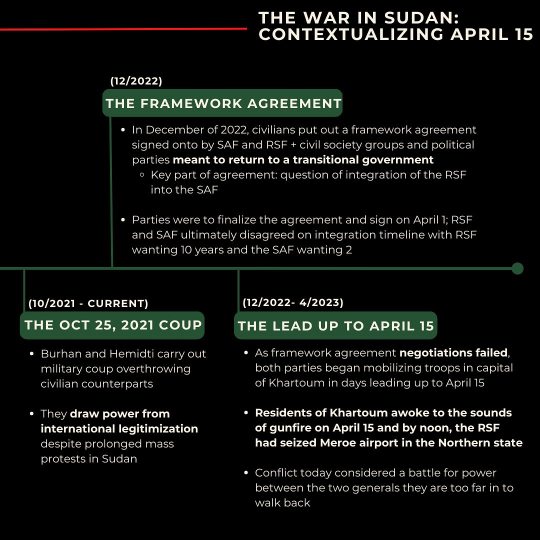
Transcript:
(10/2021 CURRENT)THE OCT 25, 2021 COUP
Burhan and Hemidti carry out military coup overthrowing civilian counterparts
They draw power from international legitimization despite prolonged mass protests in Sudan
(12/2022) THE FRAMEWORK AGREEMENT
In December of 2022, civilians put out a framework agreement signed onto by SAF and RSF + civil society groups and political parties meant to return to a transitional government
Key part of agreement: question of integration of the RSF into the SAF
Parties were to finalize the agreement and sign on April 1; RSF and SAF ultimately disagreed on integration timeline with RSF wanting 10 years and the SAF wanting 2
(12/2022-4/2023) THE LEAD UP TO APRIL 15
As framework agreement negotiations failed, both parties began mobilizing troops in capital of Khartoum in days leading up to April 15
Residents of Khartoum awoke to the sounds of gunfire on April 15 and by noon, the RSF had seized Meroe airport in the Northern state
Conflict today considered a battle for power between the two generals they are too far in to walk back

Transcript:
FRAMING ALLIANCES
Sudanese Armed Forces (SAF):
Egypt
Israel (Foreign Ministry)
Islamists
Iran
Saudi Arabia
Ukraine (SOF)
Armed Groups
Rebel groups that had taken up arms against the central government in the Bashir Era are forced to ally with the SAF due to the RSF's ethnic cleansing campaign. They include:
Justice and Equality Movement (Gibril Ibrahim)
Sudan Liberation Movement/Army (Minni Minawi)
Gathering of Sudan Liberation Forces (Abdallah Yahya)
Rapid Support Forces (RSF):
Israel (Mossad)
Libya (Khalifa Haftar)
United Arab Emirates
Central African Republic
Russia (Wagner Group)
Chad
Arab Tribal Leaders
Arab tribal leaders across the Western region of Darfur have pledged their allegiance and support to the RSF, with members of the tribes across the Sahel crossing into Sudan to join the RSF's assault as well.
Key tribes include: Beni Halba, Tarjam, Habaniya, Fallata, Misseriya, Taaysha, Rizeigat
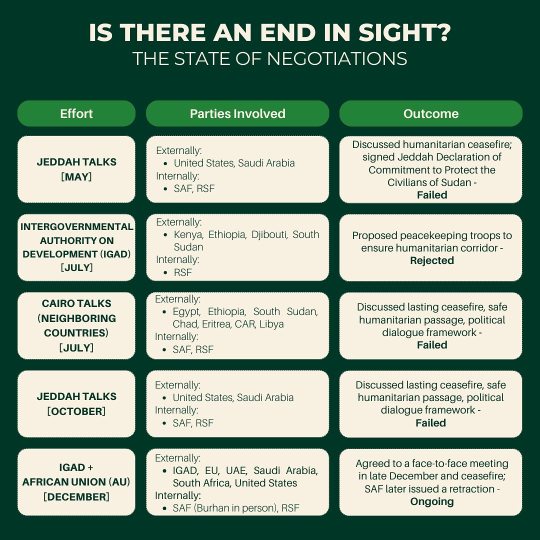
Transcript:
IS THERE AN END IN SIGHT?
THE STATE OF NEGOTIATIONS
Effort: JEDDAH TALKS [MAY]
Parties involved: Externally: United States, Saudi Arabia Internally: SAF, RSF
Outcome: Discussed humanitarian ceasefire; signed Jeddah Declaration of Commitment to Protect the Civilians of Sudan - Failed
Effort: INTERGOVERNMENTAL AUTHORITY ON DEVELOPMENT (IGAD) [JULY]
Parties Involved: Externally: Kenya, Ethiopia, Djibouti, South Sudan Internally: RSF
Outcome: Proposed peacekeeping troops to ensure humanitarian corridor - Rejected
Effort: CAIRO TALKS (NEIGHBORING COUNTRIES) [JULY]
Parties Involved: Externally: Egypt, Ethiopia, South Sudan, Chad, Eritrea, CAR, Libya Internally: SAF, RSF
Outcome: Discussed lasting ceasefire, safe humanitarian passage, political dialogue framework - Failed
Effort: JEDDAH TALKS [OCTOBER]
Parties Involved: Externally: United States, Saudi Arabia Internally: SAF, RSF
Outcome: Discussed lasting ceasefire, safe humanitarian passage, political dialogue framework - Failed
Effort: IGAD + AFRICAN UNION (AU) [DECEMBER]
Parties Involved: Externally: IGAD, EU, UAE, Saudi Arabia, South Africa, United States Internally: SAF (Burhan in person), RSF
Outcome: Agreed to a face-to-face meeting in late December and ceasefire; SAF later issued a retraction - Ongoing
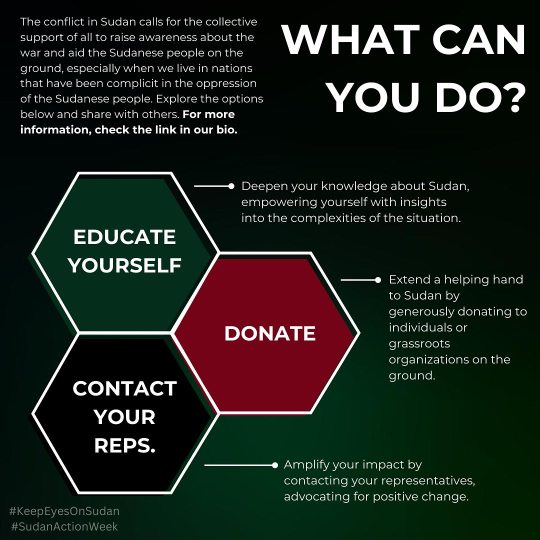
Transcript:
The conflict in Sudan calls for the collective support of all to raise awareness about the war and aid the Sudanese people on the ground, especially when we live in nations that have been complicit in the oppression of the Sudanese people. Explore the options below and share with others. For more information, check the link in our bio.
WHAT CAN YOU DO?
EDUCATE YOURSELF
Deepen your knowledge about Sudan, empowering yourself with insights into the complexities of the situation.
DONATE
Extend a helping hand to Sudan by generously donating to individuals or grassroots organizations on the ground.
CONTACT YOUR REPS.
Amplify your impact by contacting your representatives, advocating for positive change.
#sudan#keep eyes on sudan#KeepEyesOnSudan#Sudan Action Week#SudanActionWeek#i hope the way i formatted it is good#i saw a few hours ago that rsf retreated from wad madani outskirts
368 notes
·
View notes
Text
Let's talk about Sudan-
TRANSCRIPT UNDER CUT

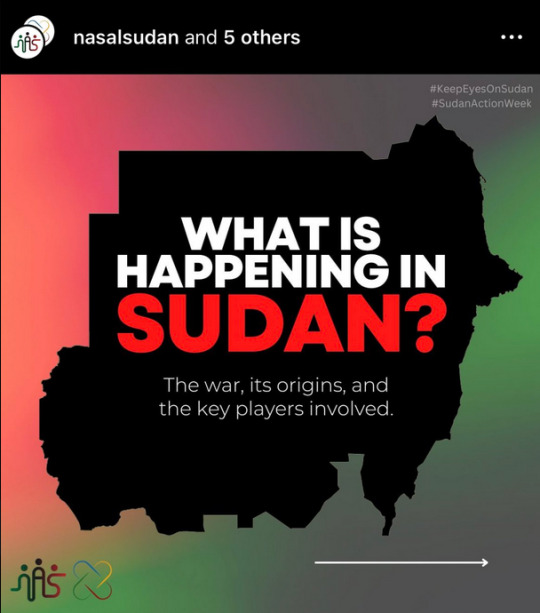
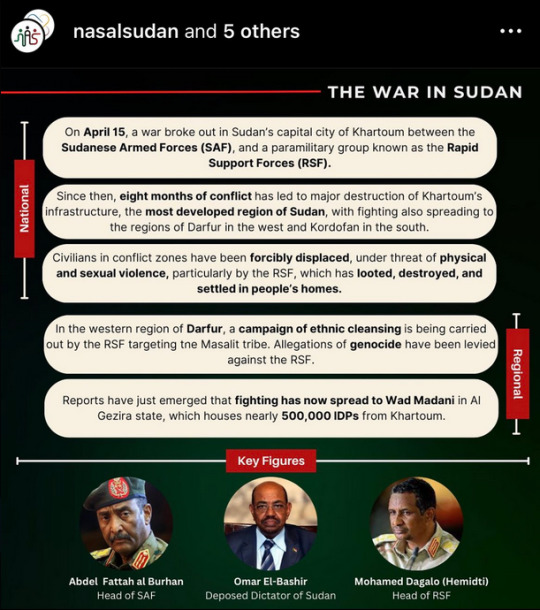
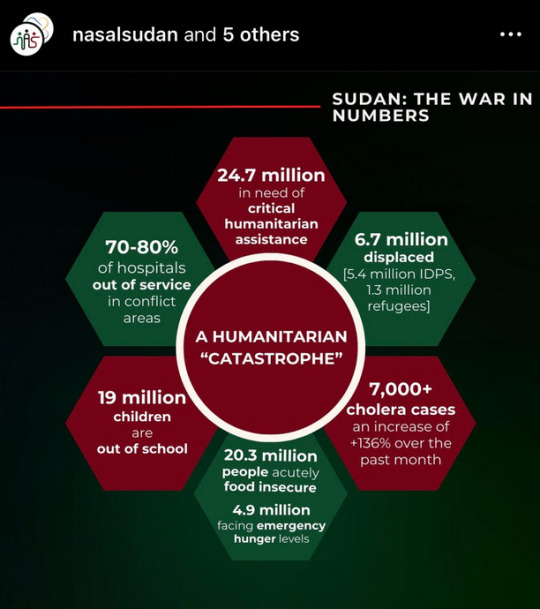

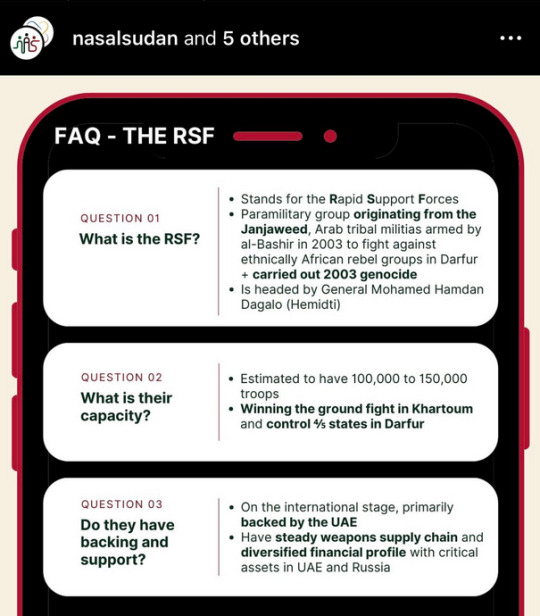
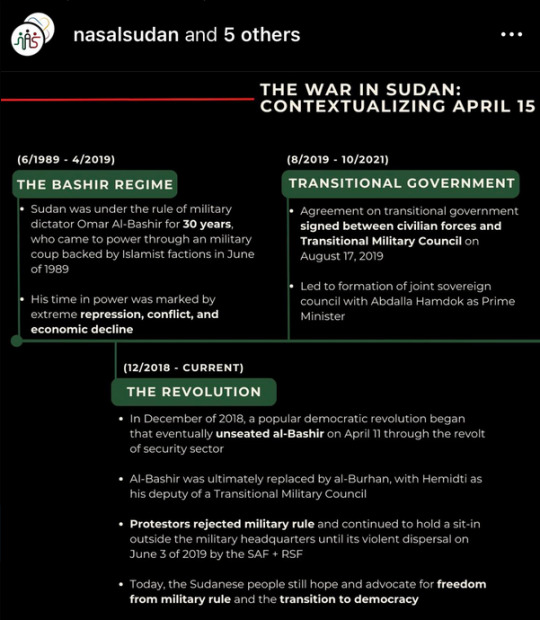
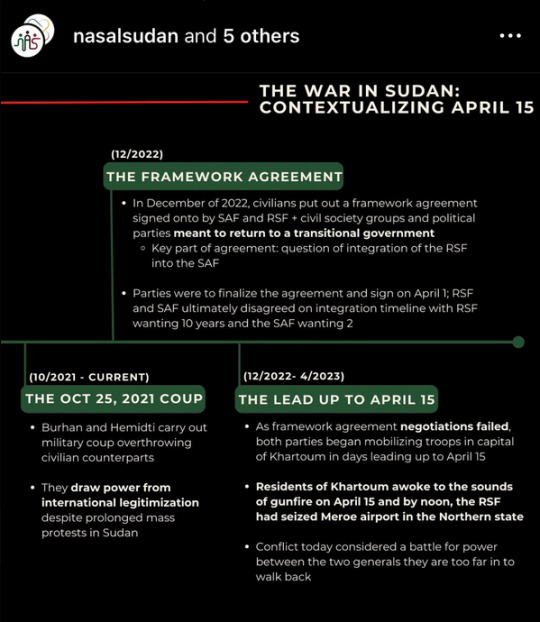
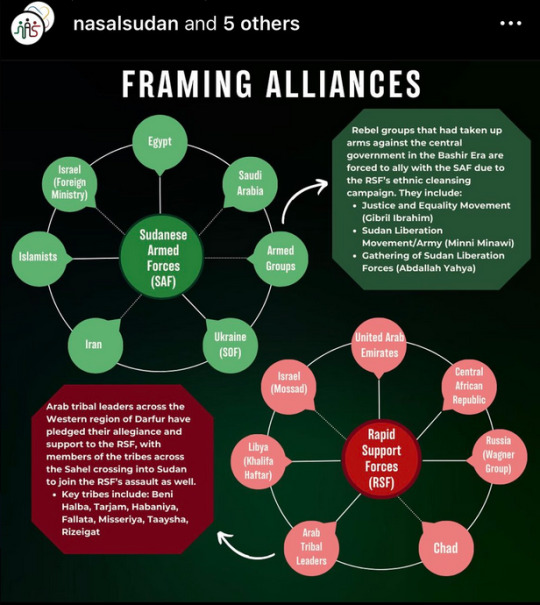
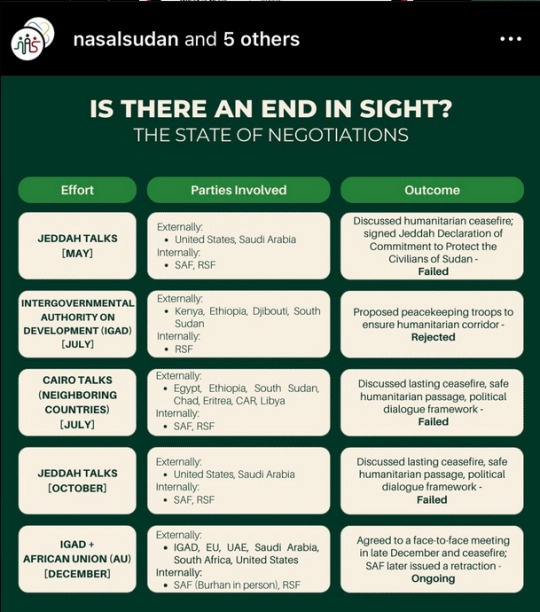
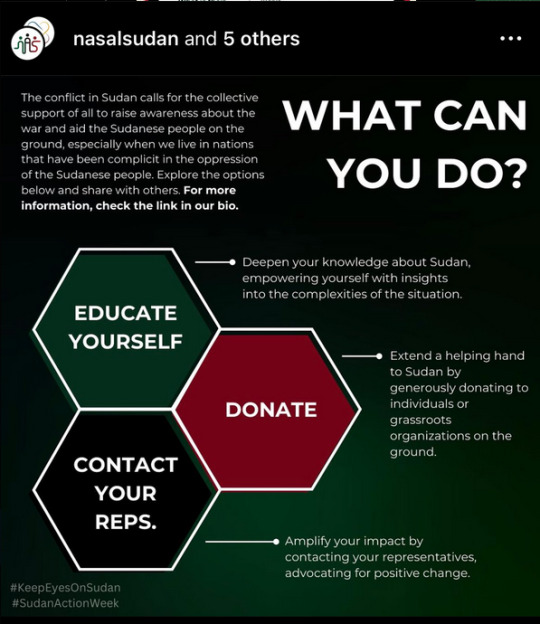
Transcript:
What is happening in Sudan?
The war, its origins, and the key players involved.
The war in Sudan
On April 15, a war broke out in Sudan's capital city of Khartoum between the Sudanese Armed Forces (SAF), and a paramilitary group known as the Rapid Support Forces (RSF).
Since then, eight months of conflict has led to major destruction of Khartoum's infrastructure, the most developed region of Sudan, with fighting also spreading to the regions of Darfur in the west and Kordofan in the south.
Civilians in conflict zones have been forcibly displaced, under threat of physical and sexual violence, particulary by the RSF, which has looted, destroyed, and settled in people's homes.
In the western region of Darfur, a campaign of ethnic cleansing is being carried out by the RSF targeting the Masalit tribe. Allegations of genocide have been levied against the RSF.
Reports have just emerged that fighting has now spread to Wad Madani in AI Gazira state, which houses nearly 500,00 IDPs from Khartoum.
Key Figures: Abdel Fattah al Burhan (head of SAF), Omar El-Bashir (deposed dictator of Sudan), Mohamed Dagalo (Hemidti) (head of RSF)
Sudan: the war in numbers
24.7 million in need of critical humanitarian assistance
6.7 million displaced [5.4 million IDPS, 1.3 million refugees]
7,000+ cholera cases an increase of +136% over the past month
20.3 million people acutely food insecure- 4.9 million facing emergency hunger levels
19 million children are out of school
70-80% of hospitals out of service in conflict areas
FAQ - THE SAF
What is the SAF?
stands fro the Sudanese Armed Forces
is the de-facto government of Sudan
is headed by Lt. General Abdel Fattah al-Burhan
What is their capacity?
estimated to have aprox. 200,000 personnel and tactical advantage of airforce
currently control of relative northern and eastern regions of Sudan with functioning capital in Port Sudan (East)
Do they have backing and support?
on the international stage, primarily backed by Egypt
limited weapons supply from allies
internally, the SAF is ultimately considered the lesser of two evils
FAQ - THE RSF
What is the RSF?
stands fro Rapid Support Forces
paramilitary group originating from the Janjaweed, Arab tribal militias armed by al-Bashir in 2003 to fight against ethnically African rebel groups in Darfur + carried out 2003 genocide
is headed by General Mohamed Hamdan Dagalo (Hemidti)
What is their capacity?
estimated to have 100,000 to 150,000 troops
winning the ground fight in Khartoum and control 4/5 states in Darfur
Do they have backing and support?
on the international stage, primarily backed by the UAE
have steady weapons supply chain and diversified financial profile with critical assets in UAE and Russia
The war in Sudan: contextualizing April 15
6/1989 - 4/2019 - The Bashir Regime
Sudan was under the rule of military dictator Omar Al-Bashir for 30 years, who came to power through an military coup backed by Islamist factions in June of 1989
His time in power was marked by extreme repression, conflict, and economic decline
12/2018 - current - The revolution
In December of 2018, a popular democratic revolution began taht eventually unseated al-Bashir on April 11 through the revolt of security sector
Al-Bashir was ultimately replaced by al-Burhan, with Hemidti as his deputy of a Transitional Military Council
Protestors rejected military rule and continued to hold a sit-in outside the military headquarters until its violent dispersal on June 3 of 2019 by the SAF + RSF
Today, the Sudanese people still hope and advocate for freedom from the military rule and the transition to democracy
8/2019 - 10/2021 - Transitional Government
Agreement on transitional government signed between civilian forces and Transitional Military Council on August 17, 2019
Led to formation to joint sovereign council with Abdalla Hamdok as Prime Minister
10/2021 - Current - The Oct 25, 2021 Coup
Burhan and Hemidti carry out military coup overthrowing civilian counterparts
They draw power from international legitimization despite prolonged mass protests in Sudan
12/2022- The Framework Agreement
In December of 2022, civilians put out a framework agreement signed onto by SAF and RSF + civil society groups and political parties meant to return to a transitional government - key part of agreement: question of integration of the RSF into the SAF
Parties were to finalize the agreement and sign on April 1; RSF and SAF ultimately disagreed on the integration timeline with RSF wanting 10 years and the SAF wanting 2
12/2022-4/2023 - The Lead up to April 15
As framework agreement negotiations failed, both parties began mobilizing troops in capital of Khartoum in days leading up to April 15
Residents of Khartoum awoke to the sounds of gunfire on April 15 and by noon, the RSF had seized Meroe airport in the Northern state
Conflict today considered a battle of power between the two generals they are too far in to walk back
Framing alliances
Sudnese Armed Forces (SAF):
Saudi Arabia
armed groups- rebel groups that had taken up arms against the central government in the Bashir Era are forced to ally with the SAF due to the RSF's ethnic cleansing campaign. They include: Justice and Equality Movement (Gibril Ibrahim), Sudan Liberation Movement/Army (Minni Minawi), Gathering of Sudan Liberation Forces (Abdallah Yahya)
Ukraine (SOF)
Iran
Islamists
Israel (Foreign Ministry)
Egypt
Rapid Support Forces (RSF):
United Arab Emirates
Central African Republic
Russia (Wagner Group)
Chad
Arab Tribal Leaders- Arab tribal leaders across the Western region of Darfur have pledged their allegiance and support to the RSF, with members of the tribes across the Sahel crossing into Sudan to join the RSF's assault as well. Key tribes include: Beni Halba, Tarjam, Habaniya, Fallata, Misseriya, Taaysha, Rizeigat
Libya (Khalifa Haftar)
Israel (Mossad)
Is there an end in sight?
The state of negotiations
Effort- Jeddah Talks [May]
Parties Involved- Externally: United States, Saudi Arabia. Internally: SAF, RSF
Outcome: discussed humanitarian ceasefire; signed Jeddah Declaration of Commitment to Protect the Civilians of Sudan- FAILED
Effort- Intergovernmental authority on development (IGAD) [July]
Parties Involved- Externally: Kenya, Ethiopia, Djibouti, South Sudan . Internally: RSF
Outcome: proposed peacekeeping troops to ensure humanitarian corridor-REJECTED
Effort- Cairo talks (neighboring countries) [July]
Parties Involved- Externally: Egypt, Ethiopia, South Sudan, Chad, Eritrea, CAR, Libya. Internally: SAF, RSF
Outcome: discussed lasting ceasefire, safe humanitarian passage, political dialogue framework-FAILED
Effort- Jeddah talks [October]
Parties Involved- Externally: United States, Saudi Arabia . Internally: SAF, RSF
Outcome: discussed lasting ceasefire, safe humanitarian passage, political dialogue framework-FAILED
Effort- IGAD + African Union (AU) [December]
Parties Involved- Externally: IGAD, EU, UAE, Saudi Arabia, South Africa, United States. Internally: SAF (Burhan in person), RSF
Outcome: agreed to face-to-face meeting in late December and ceasefire; SAF later issued a retraction-ONGOING
What can you do?
The conflict in Sudan calls for the collective support of all to raise awareness about war and aid the Sudanese people on the ground, especially when we live in nations that have been complicit in the oppression of the Sudanese people. Explore the potions below and share with others.
Educate yourself- deepen your knowledge about Sudan, empowering yourself with insights into the complexities of the situation.
Donate- extend a helping hand to Sudan by generously donation to individuals or grassroots organizations on the ground.
Contact your reps- amplify your impact by contacting your representatives, avocating for positive change
221 notes
·
View notes
Note
Do you have any advice for someone who has most of an archaeology degree, but following some health problems during covid foricng me to withdraw from some classes, I didn't meet pace of progress and lost my financial aid and now owe my university $13k for the semester i didn't complete. I'm a 3.8gpa student and was deans list, but I have an enrolment and transcript hold until I pay them back. I will never have $13k at my disposal to pay that off without haivng my degree to make me employable, so I'm not sure how I can ever go back and finish my degree.
Do you have any advice for how someone in my position should proceed? I thought about merit based financial aid/scholarships with my high gpa, but I've never had any success finding those.
This is a tough one, since I don't really have any direct experience with a similar situation. If anyone has specific advice, please let me know.
Education loans/debt are special legal creatures, and perhaps the most important thing you can do is educate yourself on the legalities of your particular situation and what options are available to you. Here's a page I found that talks about the legal precedents for certain types of education loans. From what little I understand, the school is not looking for you to pay the $13k back all at once. There may be payment plans or settlements available to you.
The first thing that comes to mind is to contact your school's ombudsman. This is an office whose single purpose is to help students navigate institutional bureaucracy and pursue grievances against the institution. They are probably the best bet for finding ways to mitigate this debt, set up options for payment, etc.
Similarly, I would recommend making an appointment to talk with someone in the financial aid department if you haven't already. It might be painful and embarrassing, but I can guarantee you that you aren't the first person who has had this exact issue, and you won't be the last. They might also be able to help you navigate ways to deal with this debt.
Some schools have policies that if you have to withdraw for health reasons before X point in the semester, you can get your tuition refunded. This is what my family was able to do when I had to drop out during my sophomore year. Whether that would be an option for you depends 1) on your school, and 2) on if you have to apply for that forgiveness within a certain window. Still worth a shot though—this is something you can ask the ombudsman about.
If you were registered with your school's disability services (provided that you're in the US, which is where my experience comes from) before you had to withdraw, they may also be able to help you advocate for yourself based on having a disability. If this is something that applies to you, it's possible that you have some protections based on the ADA, although this will depend on the nature of your financial aid, and whether you were registered beforehand. Accommodations are not retroactive.
Finally, I hate to say it, but working in archaeology—with or without a college degree—is going to make it difficult to pay off these loans. Entry level archaeology jobs pay notoriously poorly, and other positions generally require some sort of postgraduate degree. You are employable without a degree, but it may not be in your chosen field. That's shitty news, I know, but it's something you need to consider in order to start dealing with this.
Best of luck,
-Reid
37 notes
·
View notes
Text
Incomeless; will proofread your fics! (Or anything else.)
I'm not sure how to head this with a snazzy, attention-catching image given I'm not offering an obviously graphic service like art commissions, but let's give it a go...

Hello, I'm your friendly neighborhood disabled unemployed transgender queer on the internet. I have not posted a great amount about the details on this blog for privacy reasons, but I am currently in an untenable familial/financial living situation, which I am actively working to get out of. My primary barrier to disentangling myself from the pertinent parties is a lack of income. I've been unable to pursue traditional means of work due to being multiply disabled (slash chronically ill, slash treatment-resistant, et cetera...), but I do not qualify for SSI or unemployment, so I am stuck trying to find other ways of making money.
This is where you come in... If you'd like to help, you can:
$$ Hire me $$ to proofread your fics, essays, and more!
Click below for info! (I also may add separate posts for diversity reading and/or other writing- and editing-related services.)
For $0.00855/word *OR BEST BID*, I will vet your work of writing before you publish it, checking for mistakes in spelling, capitalization, & punctuation, missed words, inconsistencies of tense, formatting, & POV, and miscellaneous grammatical errors. Never again need you fear posting a finished chapter and discovering a slew of typos after the fact; no matter how sleep-deprived or late at night the state of writing, I will ensure your text is ship-shape. Or, if you happen to be interested in having other types of writing proofread before submission--essays, comics or webtoons, letters, transcripts, compositions of a personal nature, so on--I will happily take these on at a comparable rate.[1]
Qualifications:
Bachelor's degree in English with a minor in writing
Initiate of international collegiate honors society for English scholarship, Sigma Tau Delta
Active member of the International Association of Professional Writers and Editors (IAPWE)
Former lit editor for award-winning university literary arts magazine
Prior employment in tutoring and teaching English, as well as copy-editing and content writing
Nearly 20 years' writing experience
Previous experience as both fic writer and beta
Incisive eye for typo-hunting and tenacious attention to detail (I have high standards and will make those everybody else's problem... now for pay!)
I will read for content of any genre and all ratings, and am broadly[2] open to any subject matter, kinks, et cetera. I'll also post more detailed guidelines (booking process, any exclusions, additional criteria) on a separate, unrebloggable post so that any edits and updates are always current.
Message me via the chat feature on Tumblr, or send me an e-mail (I will post it on my more info post) to request a quote, bid for a slot, or just to see what I can offer for whatever project you have in mind. And please feel encouraged to share or boost this post! I am in urgent need of any income I can get, and every share counts 😭🙌
. . . . . . . . . .
Proofreading Full Details · Other Services · Support Me (alternatively, Tip this post!)
- - - - - - - - - - - - -
[1] There will be some exclusions to this, such as academic assignments/papers that have style guide requirements; i.e., I will not be your online MLA style checker or anything.
[2] As with anything, there will be sporadic exceptions to this as well, but I will always be up-front about such cases.
#proofreading#fanfic#writing help#for hire#authblr#ficblr#writers on tumblr#writeblr#other tags??? idk help me out here#proofreading post#this is tumblr let's all pretend this post is as professional as it gets and that i don't have any obsessive compulsive disorders at all
68 notes
·
View notes
Text
Accessible Videos YouTube Transcription Services
Accessible Video YouTube Transcription Services provide written text alongside videos, making content more inclusive for diverse audiences, including those with hearing impairments and non-native speakers.

Visit Us:- https://nancyhhall.blogspot.com/2023/07/enhancing-accessibility-youtube-video.html
0 notes
Text
The Bicentennial: The Invitation or The Tour that almost never was
As some of you surely are aware, the Bicentennial of La Fayette’s Tour through America in 1824/25 is fast approaching and many organizations/institutes, especially in America, have already made some form of content regarding this event.
Let us have a look at one document that stands at the start of this event – the invitation La Fayette received from the then President James Monroe on February 7, 1824.


‘Monroe and Lafayette’ (no date) Highland. Available at: https://highland.org/teacher-resources/monroe-and-lafayette/ (02/21/2024).
Everybody who has ever worked with Monroe’s papers will tell you, that his handwriting was often not, well, legible. This is completely off-topic, but one of my favourite quotes about Monroe is this statement by Edmund Bacon, one of Thomas Jeffersons overseer’s. He wrote that:
Mr. Jefferson and Mr. Madison both wrote a plain, beautiful hand, but you could write better with your toes than Mr. Monroe wrote.
The Good, the Bad, and the Ugly: A Look at Penmanship (2012) Monticello. Available at: https://www.monticello.org/research-education/blog/the-good-the-bad-and-the-ugly-a-look-at-penmanship/ (02/21/2024).
(And let us not forget that Andrea Gray wrote in the same blog post, concerning Monroe’s penmanship: “Any idea who penned that abomination?”)
I think it is not quite that bad, but Monroes handwriting is also not the subject at hand, so back to the letter. Luckily, there is a transcript by Hampton Kennedy for James Monroe’s Highland:
[Transcription Page 1]
Washington Feby [February]. 7th. 1824
My dear sir
I wrote you about a fortnight since,
a letter which I forwarded to New York to the care
of Mr Brown, in which I intimated my desire in
at liberty
case you felt yourself ^ to visit the Ustates [United States], to send
a frigate to some port of France, to receive and bring
you over. Since then Congrefs [Congress] have pafsed [passed] a re-
-solution, to that effect, expression of the affectionate
attachment of the whole nation to you, and of their de-
-sire to see you again among us. The period at which
you may deem it proper, to accept this invitation, is
life to yourself, but you may be afsured [assured], that when-
-ever it may comport with your views, of which
you will have the goodnefs [goodness] to advise me, a public
ship shall be immediately orderd [ordered] to the port which
you may designate, to carry you to the country of
your adoption in early life, + [and] which has always che-
-rished the most grateful recollection of your im-
-portant services. I send you here with a copy
of the resolution, and have only to add, the
[Transcription Page 2]
afsurance [assurance] of my high consideration and affectionate
regard.
James Monro
‘Monroe and Lafayette’ (no date) Highland. Available at: https://highland.org/teacher-resources/monroe-and-lafayette/ (02/21/2024).
And as easy as inviting La Fayette in the end was for Monroe, writing a short and simple letter, the process leading up to Monroe writing this letter was somewhat debated. Allow me to take you back to the House of Representatives on January 12, 1824, when the notion to invite La Fayette was first introduced.
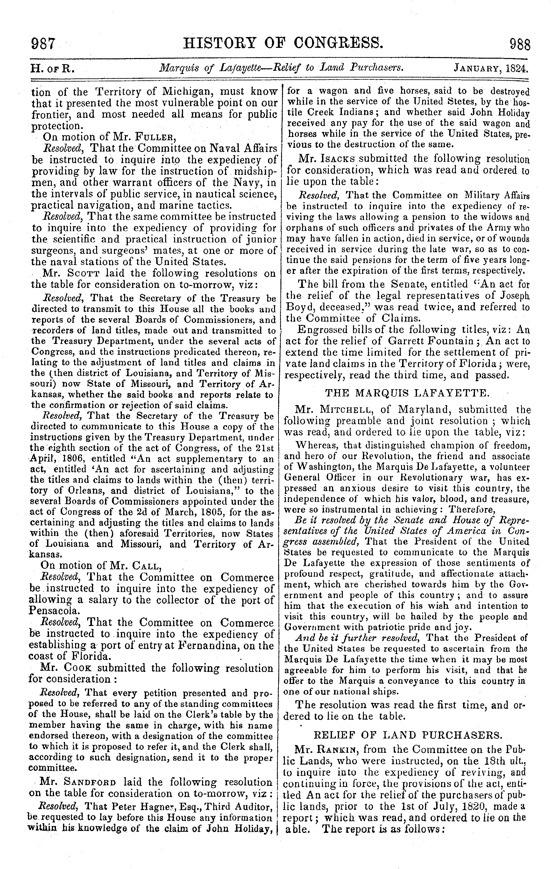
Annals of Congress, 18th Congress, 1st session, I, p. 988.
The bill took its usual route from there and on the next day, the resolution was read again and was voted on – and I know what you are all thinking. Of course the resolution passed! We all know that the Tour took place and America and Americans had such high esteem for La Fayette. They had already supported and honoured him in so many ways, most notable during the French Revolution, his imprisonment and the financial struggles following his release. Well, no. The resolution was negatived by 80 to 74 – a small margin granted, but a defeat, nonetheless.
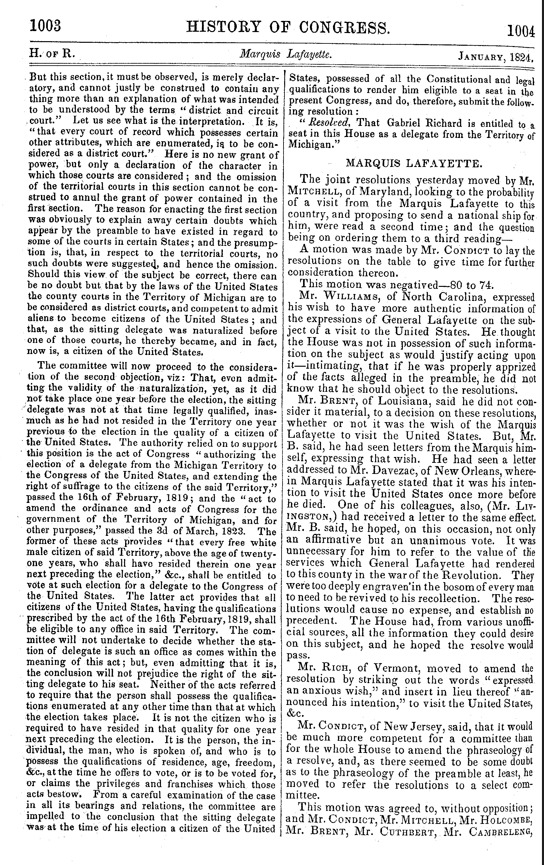
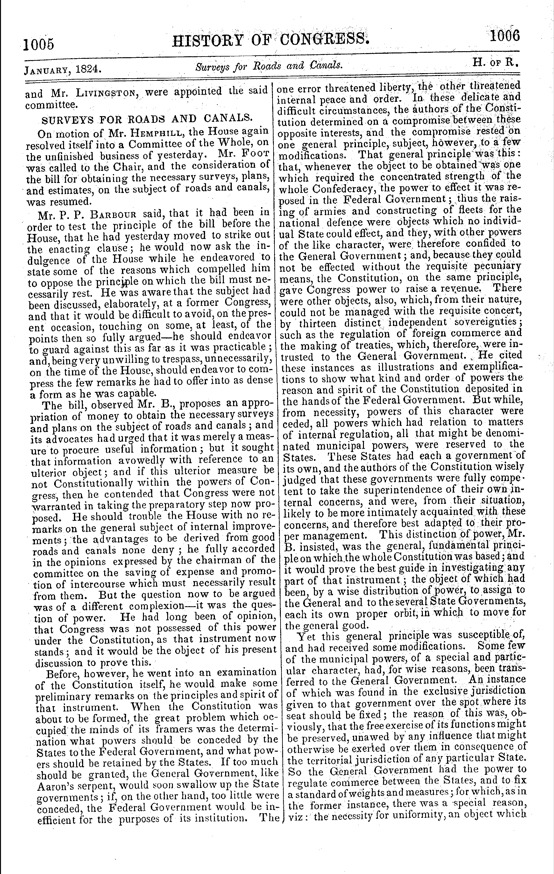
Annals of Congress, 18th Congress, 1st session, I, p. 1004-1005
Around the same time La Fayette lost his reelection for his seat in the Chambre des Députés – and now even America did not want him? Well, it was not quite that dramatic for our Marquis.
First of all, the wording of the notion was not all it could be, and a committee was there for formed to change the way the bill was phrased. Furthermore, and in contrast to his earlier visits to America, La Fayette had long outgrown “his charming, rich boy-general”-image. He had become a serious politician and a household name in Europe and European politics. His values and agendas were well known. Revolutions were spreading all throughout the western world and at that time the Greek War of Independence (1821-1829) was raging and in South America many regions declared independence and formed Republics. More generally speaking, the 1820s were a time of Revolution and La Fayette, as a general rule of thumb, always sided with the revolutionaries, the ones that fought for freedom (however you want to define the term) and independence. He loudly advocated for Greek and South America, he gave money to Italian and Spanish exiles. In short, he was advocating for Revolution and not everyone liked that. In 1815, after Napoléon Bonaparte’s final defeated the so-called Holly Alliance (Austrian Empire and the Kingdoms of Russia and Prussia) was formed with the expressed aim to keep liberalism in check. In America itself there were varying opinions on how to respond to what was happening and these subjects became even more prominent with Monroe’s presidency and his Monroe-Doctrine. Add to this La Fayette’s dislike for the principles of slavery. Slavery was in the 1820’s not quite such a hot topic as it would later be, but it was still a touchy subject and La Fayette’s opinions, as with everything else, were well known. And, as Mr. William of North Carolina remarked, was the Congress sure that La Fayette even wanted to come?
With all that in mind, the resolution was amended and reintroduced on January 20, 1824:
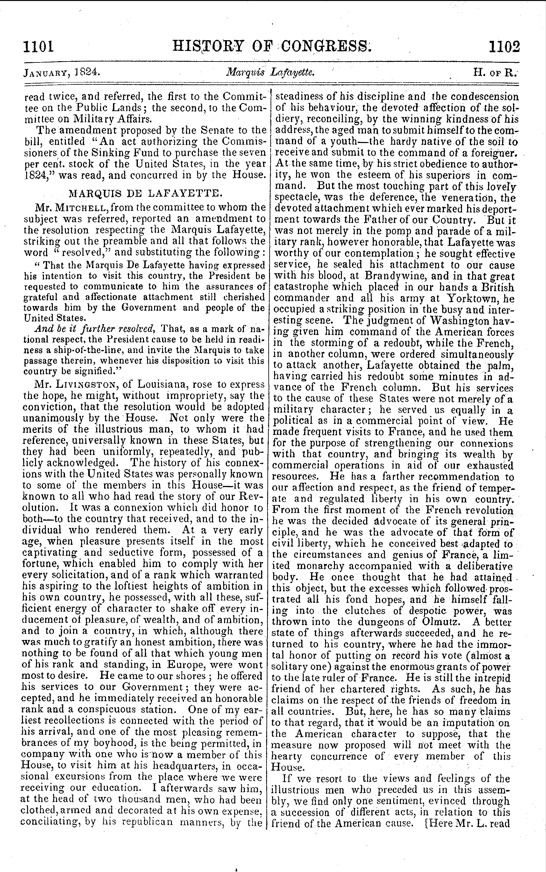

Annals of Congress, 18th Congress, 1st session, I, p. 1101-1104.
After the new text and a letter by La Fayette expressing his desire to return to America once more before his death were read, the resolution was unanimously agreed upon. There is no hard evidence, but some contextual evidence suggesting that Monroe really urged Congress to pass the resolution.
The problem therefor was not with La Fayette as a person. There still was the deep connection between a man and a people who both owned each other a great deal. The visit was a personal affair that had also a strong political connection, both on a national and an international level. It was a “yes” from America to La Fayette and his believes and it also was a “yes” from La Fayette to America and American politics. And while everything went down just fine, there was still the question regarding the implications this invitation and visit had. Monroe, a personal friend of the La Fayette’s, who had helped Adrienne a great deal during the French Revolution and who supposedly had urged Congress to pass said resolution, wrote, somewhat anxiously, to Thomas Jefferson on October 18, 1824:
His mov’ment, since his arrival in the UStates, has been well directed. Had he visited this city in the first instance, the compromitment of the govt, with the holy alliance, would have been much greater, than by going directly to our fellow citizens, & from them to the govt. By this course, the nation has the credit. The holy alliance, & all the govts of Europe, must therefore look to us, as an united people, devoted to the principles of our revolution & of free republican government.
“To Thomas Jefferson from James Monroe, 18 October 1824,” Founders Online, National Archives, https://founders.archives.gov/documents/Jefferson/98-01-02-4634. [This is an Early Access document from The Papers of Thomas Jefferson: Retirement Series. It is not an authoritative final version.] (02/21/2024).
And that is, in summary, how La Fayette’s visit to America in 1824/1825 came to be.
#to be fair the title is a tad dramatic#marquis de lafayette#la fayette#french history#american history#history#european history#thomas jefferson#james monroe#letters#founders online#1824#politics#lafayette#the bicentannial#the tour of 1824/1825
18 notes
·
View notes
Text
Transcript Episode 84: Look, it's deixis, an episode about pointing!
This is a transcript for Lingthusiasm episode ‘Look, it's deixis, an episode about pointing!’. It’s been lightly edited for readability. Listen to the episode here or wherever you get your podcasts. Links to studies mentioned and further reading can be found on the episode show notes page.
[Music]
Gretchen: Welcome to Lingthusiasm, a podcast that’s enthusiastic about linguistics! I’m Gretchen McCulloch.
Lauren: I’m Lauren Gawne. Today, we’re getting enthusiastic about pointing. But first, this episode is brought to you by all of the fantastic people who have supported the podcast by becoming patrons or buying merch over the years. We don’t work with a big production company or anything; it’s just us. We’re really able to just keep doing the show because of your support both in recommending the show to other people and when you’re able to help us financially.
Gretchen: I was pretty worried when we were first trying to figure out how to keep Lingthusiasm sustainable. Like, were we gonna have to run ads for some sketchy, learn-a-language-overnight type service?
Lauren: We get some interesting pitches.
Gretchen: Oh, we sure do. I mean, I don’t think the language learning platforms are all bad. I just wouldn’t feel comfortable endorsing one without trying it out for hundreds of hours, at which point, that’s not really very cost effective. It’s easier to just say no. So if you like that Lingthusiasm exists, and you wanna help us continue to exist for many years in the future, we’d really appreciate your support – especially on Patreon.
Lauren: Our most recent bonus episode for patrons was an interview with Martha Tsutsui-Billins – a name you might recognise from the credits of this show. We chatted about her work on politeness in Amami, fieldwork in Japan, and her podcast, Field Notes.
Gretchen: To listen to this bonus episode, many other bonuses, and to help keep the show running ad-free, go to patreon.com/lingthusiasm.
[Music]
Lauren: “Hey, look! This is a podcast.”
Gretchen: “Yes, THIS episode, right here, now.” Lauren, no one can see that you’re pointing right now.
Lauren: Hm, yeah, it’s a pity because this is one of my favourite types of episodes where we’re gonna talk about gesture in an audio-only format.
Gretchen: You know, you really picked a very interesting combination of being a gesture specialist in so far as your research goes and also having a podcast which is audio-only.
Lauren: That’s okay because one of my favourite things to do is explain gestures that we do all the time in a whole lot of detail because it makes you realise how impressive they are. Pointing is one of my favourites of these.
Gretchen: So, O Pointing Expert, tell us about pointing.
Lauren: Pointing is a very human activity where we use a part of our body, and we project out from our body this invisible line towards something. Another human is able to look at that point, and look at that invisible line, and figure out what our invisible line is pointing at and figure out that we’re looking at the same thing. We do this without thinking about it all the time.
Gretchen: We humans do this invisible string, invisible line thing that can be following a finger or the whole hand, or an eye gaze, or several things like that. Do animals do this?
Lauren: It depends on what animals we’re talking about. Apes, our nearest relations, they gesture, but they don’t point, and they don’t seem to get the idea of pointing.
Gretchen: If you try to point to something, a gorilla or a chimpanzee or a bonobo or something is gonna be like, “I don’t know. I’m just gonna look at your finger,” or whatever.
Lauren: Yeah. There’s hundreds of hours of chimpanzee gesture studies and gorilla gesture studies, and they don’t point. It’s not part of their communicative collection of skills. But dogs are really good at following human points.
Gretchen: Dogs don’t necessarily point themselves.
Lauren: They don’t necessarily point themselves.
Gretchen: But if you point to something, they can follow that. I feel like I’ve seen humans try to point at a treat or something that’s on the ground for a dog, and the dog is just sitting there looking at your finger being like, “I don’t know what you want from me.” Finally, you tap your foot by the treat, and the dog’s like, “Oh, this, okay.” But you’re saying that maybe I should’ve just trained this dog better.
Lauren: Let me clarify. Some dogs seem to do it with very little training. Some dogs seem to take more training but can follow a point – compared to wolves which are not domesticated and don’t engage with pointing. There is a research paper that says that cats don’t engage with pointing either.
Gretchen: Do cats just not engage with pointing, or do they not want to engage with pointing that they understand perfectly well?
Lauren: The paper doesn’t make clear –
Gretchen: [Laughs] We don’t know. They’re cats.
Lauren: We can’t know what happens in the minds of cats. I have had students, when I’ve talked about non-humans and pointing, say that their cat can follow pointing. This is perhaps an under-researched area, and there may be cats that have this skill. Maybe all cats have this skill and have just decided to withhold it from us. But beyond humans, pointing is not necessarily a skill that other animals have.
Gretchen: That is kind of fascinating because I think of it as pretty basic. A lot of babies can point before they can talk.
Lauren: Mm-hm. Pointing is normally a pathway to other forms of language and communication.
Gretchen: You can train animals to respond to particular words, but it’s harder to train them to respond to points.
Lauren: It’s because of that magic invisible line between – they just look at your finger. In fact, it’s weird that we don’t immediately just look at the end of someone’s finger and instead we look at some invisible line shooting off.
Gretchen: You can’t see me right now, but I have my hand up, and I’m pointing an invisible finger, and there it is. You said, “invisible finger.” Sometimes, pointing happens with the index finger. Sometimes, it happens with the middle finger, with the whole hand. I guess you could point with your elbow if your hands were occupied. Or maybe you could point with your thumb if you’re pointing back in that direction. Is there research on pointing with various parts of the body?
Lauren: Absolutely. We talk about pointing with the finger and particularly the index finger as the most common. When we were pointing – that you couldn’t see at the top of the episode – that might have been the kind of pointing you were thinking of, but it’s by no means the only way that pointing happens. There are different ways of pointing that are easier in communication. You mentioned if your hands are full, you might point with your elbow or your foot or a little chin flick. When we’re pointing at something that’s not a specific thing but maybe like a group of trees or somewhere far away, we might use an open hand rather than the more narrow line of a specific finger.
Gretchen: That’s true. If you’re trying to create an invisible web or an invisible waft of string – I dunno how the metaphor goes – trying to paint with a broad, invisible brush.
Lauren: If we’re pointing to someone or something behind us, it’s often easier to just do a little flick of the thumb backwards. It’s just the shape of the hand makes that easier to do. We don’t think of that as strange.
Gretchen: I’m currently pointing behind me with my index finger. It is very awkward. I hope everyone who’s listening is also trying out these points.
Lauren: There’s this really wonderful corpus study from Kensy Cooperrider – who a lot of this work comes from because he did his entire PhD thesis on pointing – where if you’re pointing towards yourself as a physical thing, you will use your index finger, but if you’re talking about yourself as an identity, as a human, embodied, living creature with a mind, the mental you, you’re more likely to do it with an open hand.
Gretchen: Interesting. I was feeling myself doing that as you were saying it.
Lauren: Sometimes, the variation is what’s easiest for your hands to do, and sometimes, it does convey something slightly different. Like, I’m pointing at one thing or many things in the distance.
Gretchen: That makes sense.
Lauren: Sometimes, the difference is depending on the culture that you’re in and the cultural practices you have. Middle finger pointing – a lot of kids will point with their middle finger just because they’re figuring out manual dexterity. It’s hard to wiggle your fingers around, and it is very funny, but it is also a common way of pointing in some cultures. There’s some really nice work from Central Australia that people will default use their middle finger rather than their index finger.
Gretchen: So, these would be cultures where the middle finger doesn’t have this taboo, obscene meaning that it has for me and a lot of English speakers.
Lauren: Indeed.
Gretchen: Because that’s certainly something that overrides the pointing meaning. I have seen some English speakers point with their middle finger, and I’m always giggling, but, yeah, people do do it sometimes.
Lauren: Once you notice it, you realise it is more common. We have this idea of default ways of pointing, and things are actually a lot more varied. Also, eye pointing. Again, Kensy Cooperrider has this really nice paper on Yupno from Papua New Guinea where people will do this really prominent gaze and pop of their eyes towards something as a way of pointing. Lip pointing is a thing that we see whether it’s the lower lip or both lips purse outwards. In Southeast Asia we see this, across Africa. There’s a really cute scene in Encanto, which is set in Columbia, where Mirabel points with her lips towards a gift she wants to give her little cousin. It’s this really sweet moment and a really nice culturally appropriate use of pointing.
Gretchen: That’s great. I think I could do eye pointing especially if I was in a public space and trying to gesture to “Oh, this person has a really cool hat on” or something, and I didn’t wanna put out my full hand and be like, “Oh my god, check out that person’s hat!” I’m gonna be like, “Look, look behind you. There’s a person with a cool hat.” But I don’t think I have lip pointing for myself.
Lauren: Yeah. Because we get this cultural variation. That’s really interesting to see across the world. We also have variation in what it is not appropriate to point at or how it’s not appropriate to point. There’s this amazing study that Robert Blust did over the years of collecting examples of cultures where it’s rude to point at rainbows. He collected 124 different examples of cultures where it is taboo to point at a rainbow.
Gretchen: It’s bad luck or something to be like, “Oh my god, look, a rainbow,” pointing at it?
Lauren: Exactly. These cultures are so spread out around the world that it’s not likely to be something that was a recent cultural story that they all share. It’s from all corners of the world.
Gretchen: It may be really ancient or something. That’s fascinating. I definitely don’t have any taboos about pointing to rainbows. I probably always point at a rainbow when I see it because I’m like, “Oh, great, a rainbow, look!”
Lauren: I feel more compelled to point because it’s so exciting to see one. You may have a taboo around pointing at people.
Gretchen: Hmm, I mean, I guess, in some contexts.
Lauren: Given that you were just doing a low-key eye point at someone’s cool hat. You probably wouldn’t do a big index finger point at someone in public and be like, “Cool hat!”
Gretchen: I feel like that’s especially if there’s a kid, and they’re commenting on some aspect of the body. They’d be like, “Oh my god, Mommy, look at that lady’s blue hair!” And you’re like, “Oh, I’m so sorry. My kid should not be commenting on you.”
Lauren: I can just hear the parent voice that’s like, “Don’t point. It’s rude to point.” This is clearly a taboo I have been taught.
Gretchen: I don’t know that I’ve been taught so much it’s rude to point as I’ve been taught it’s rude to comment on strangers’ appearances in public in a way that they can hear you, but I think it comes down to a similar type of thing.
Lauren: Yeah. Because an index finger point, in particular, is really prominent and visible and very obvious what’s happening, and so you can see how that fits in with that taboo. It says a lot about the name “index finger” as a term for that finger that we have between our thumb and our middle finger.
Gretchen: So, that “-dex” in “index” is from a Greek word meaning “pointing” or “showing.”
Lauren: Which is why an index in the back of a book points back to other bits of the book that you might wanna read on that topic or an economic index points to something that’s happening in the economy.
Gretchen: You sometimes get, especially in older texts, this drawn pointing index finger in the side of the book which can point to particular passages and say, “Oh, this is particularly important” or “This is interesting.” People would draw them in by hand or they could be somewhere to index particular things. It’s also related to a word that’s used for various types of pointing things – both gestural pointing and grammatical pointing – in linguistics.
Lauren: We’ve called them “pointing gestures” so far, but the more technical term for them is “deictic gestures.”
Gretchen: “Deixis” is one of those words that, at the same time, it’s so useful, and it’s so cool, and it’s so hard to say, and it’s so hard to spell.
Lauren: I have genuinely double-checked the spelling several times even just in the preparation of this show because you have “deixis,” which is D-E-I-X-I-S, and then “deictic,” which is related, is D-E-I-C-T-I-C.
Gretchen: So, you could say “a deictic word” or a “deictic gesture.” That’s just the adjective form. That one’s got a C instead of an X. I hear people say /daɪɪksis/ /dɛɪksis/ /daɪksis/. There’s all these different ways of saying it. It’s not spelled like the “-dex” in “index.” There’s an extra I in there. It’s so useful, and there’re so many things that are deictic, and I wanna talk about it all the time, and yet, it’s this word that feels very complicated. Hopefully, by saying it a lot in this episode, we can point a path toward it being more useable in the future, maybe.
Lauren: Excellent. We do tend to use “pointing” and “deixis” interchangeably, but I guess “deixis” is the academic term for pointing.
Gretchen: Right. It’s useful to have an academic term because there are a lot of grammatical things that are deictic that we don’t necessarily think of as being literal pointing. One example is that pronouns are all deictic. When I say “I,” I’m referring to “Gretchen.” I’m pointing to the “I” that is me that is Gretchen.
Lauren: That’s really interesting because when I use “I,” I use it to point to “Lauren.”
Gretchen: Right. Same thing when I say “you” – well, in this context, I’m referring to “you,” Lauren, but in fact, I do talk to other people also at other times, and sometimes “you” refers to other people, also.
Lauren: Interesting. Because I use “you” to refer to everyone who’s listening to this episode.
Gretchen: Well, I can also use “you” for that. [Laughs] And same thing if I’m saying, “Lauren, my co-host, she’s done this,” or like, “We, the co-hosts of Lingthusiasm,” all pronouns refer to things and people that are dependent on context. They’re all pointing to someone or something that’s in a particular space.
Lauren: We have a whole episode on pronouns because unpacking what’s happening with these little words that are pointing to different people and different things at any given time, there’s a lot happening there that’s really interesting.
Gretchen: Sign languages also use a specific version of pointing when it comes to pronouns, right?
Lauren: Yeah, they make use of the fact that they are visual languages, and they make use of this human tendency to point. A lot of sign languages you’ll see their pronoun system, the “I” and the “you” and the “we,” is done through a kind of pointing. For example, Auslan and BSL, as the sign languages I know best, will use an index finger point. But even though it looks like an English pointing gesture that you’ll commonly use as an English speaker, there are differences. There’s this really nice study that a group of sign language researchers led by Jordan Fenlon and a bunch of gesture researchers – again, Kensy Cooperrider’s name comes up – worked together to look at signed and spoken uses of pointing. You see these really consistent differences as well as these similarities. So, even though you see a lot of index pointing in both, for a signed language, the index finger tends to get used a lot more consistently. We talked before about how, as an English speaker, you might use a thumb to point behind you or an open hand. In a signed language, because it’s a pronoun and it’s part of the grammar, the form is much more consistent in how it’s used, but it’s also a little bit reduced. The index finger isn’t always as extended. It’s not held for as long. It’s much more reduced because it is a part of the grammar that people are using all the time. It’s this really nice thing that shows pointing and signed pronouns use the same resource but in slightly different ways.
Gretchen: My favourite thing about pointing and signed pronouns is from a study in American Sign Language which studied these two d/Deaf children of d/Deaf parents. The study’s from Laura Petitto. The kids are pointing to persons, objects, locations, all over the place, but then they go through this process where they’re requiring specifically the pronominal points where you’re pointing to yourself to mean “me,” or you’re pointing to someone else to mean “you.” The kids, like how kids who are acquiring English and lots of other languages, sometimes acquire pronouns backwards.
Lauren: Yes.
Gretchen: Sometimes, you’ll get a kid who’s like, “You’re tired,” and the kid’ll be like, “Yes, you’re tired,” and they actually mean that “Me, I’m tired.” They’re tired.
Lauren: They haven’t figured out that “I” means “Lauren” for me and “Gretchen” for you. They just think “you” is the reference for them.
Gretchen: Right. It makes a lot of sense because they don’t have that context to – no one is actually saying, “Okay, the thing you need to say is ‘I’m tired’.” You just have to infer the –
Lauren: They haven’t figured out the pointing element of the pronouns.
Gretchen: The cool thing about this ASL study is that the kids do this same “you” pointing reversal. They’re making the pointing “you” to refer to themselves.
Lauren: That is super nifty.
Gretchen: Isn’t that cute?
Lauren: I love that the research you cite also reinforces that pointing in signed languages is much more grammatical and like pronouns, but it is heaps cuter than the example that I had.
Gretchen: It’s very cute, but exactly, it reinforces how it’s really grammaticalised because they’re aware that when they’re pointing to the dog or the cake or something that they’re pointing to that object, but they interpret the “you” point as grammaticalised to refer to themselves even though it’s literally not pointing to themselves.
Lauren: Huh, excellent. I’m so delighted there’s a parallel.
Gretchen: It’s the same ages as when hearing kids get this correct – around 25-27 months.
Lauren: Because, again, this deictic function that feels really simple, and we think of pronouns as a really basic thing that you acquire early in any language that you learn, is actually something that is, in terms of thinking and cognition, really, really hard.
Gretchen: Right, exactly. Another really common type of deictic is words like “this” and “that” and “here” and “there.” If I say something like, “Put that over there.”
Lauren: Uh, put what over where?
Gretchen: Exactly. Because these are contextual, you can’t see what I’m pointing at. You can’t see that I want you to pass me the cake.
Lauren: Also, I’m not putting down this cup of tea quite yet.
Gretchen: But I want this! And this highlights pronouns are basically inherently deictic, but there’re lots of other categories of words that can be used deicticly or not. If we have an example like, “I love this city.”
Lauren: I’m gonna assume you mean the city that you are currently in, which is actually not the same city that I’m in.
Gretchen: Exactly. This requires knowledge of my current location. If I say, “I went to this city one time, and I saw this amazing cat” or something, that’s probably referring to a specific city, but it’s not identifying it anywhere there. It’s more like, “I went to a city,” which doesn’t identify it contextually.
Lauren: In fact, I assume it’s not the city you’re currently in.
Gretchen: In fact, it’s true. If I’m telling an anecdote that way, “I went to this city one time,” doesn’t mean I went to THIS city one time.
Lauren: It would be very weird.
Gretchen: English has basically two levels of closeness. We have “this” and “here,” which is something that’s close to the speaker, and we have “that” and “there,” which is further from the speaker. But we used to have “yon” and “yonder.”
Lauren: Indeed, we did.
Gretchen: “Peasant, fetch me yon book, and carry it yonder!” I feel like it’s sort of olde-y time-y.
Lauren: It definitely does sound olde-y time-y, and it means something that’s not as close as “here” and not as far as “there.”
Gretchen: No, it’s further. It means like, “over there.”
Lauren: Oh, okay. It’s so old I don’t even have a sense of what it means.
Gretchen: Right. “Yon” and “yonder” is like, “over there,” which we still have, it just takes two words. But there’re some languages like Spanish has “esta” or “esto,” which is close by, “esa,” which is a medium distance – sometimes the middle one is also used for stuff that’s near the hearer or near the recipient – and “aquel, aquella,” which is like, “over there,” sometimes also used for something that’s neither close to the speaker nor the hearer.
Lauren: Huh, useful. I love having more distinctions than “here” and “there.” I love it when I learn a language that has that.
Gretchen: There’s lots of these languages. Serbo-Croation has it – Korean, Japanese – Thai has it. Turkish has this three-way distinction.
Lauren: People from all kinds of language families realising you need more than a “here” and a “there.”
Gretchen: Right. And then there’re a few languages that have even more fancy systems.
Lauren: Ooo, excellent.
Gretchen: Sinhala, which is an Indic language spoken in Sri Lanka, it has a four-way system – near the speaker, near the addressee, close to a third person (visible), and then far from everybody (not visible). I dunno what you do with a complicated situation where you have something that’s far from everybody, but it’s still visible, or visible but close to – you know.
Lauren: I’m sure someone has a very good experiment you could use to tease out those distinctions.
Gretchen: But there is a four-way distinction that gets further and further away. Then Malagasy, which is an Austronesian language spoken in Madagascar, has a seven degree of distance system.
Lauren: Ooo, how satisfying.
Gretchen: Plus, two degrees of visibility.
Lauren: So good. Do you think it has anything to do with the fact that Malagasy is right near Africa, but it’s actually an Austronesian language, most of which is spoken in Asia? Do you think that they just needed all those distances to account for how far –
Gretchen: To refer to their distant cousins over in the Philippines and Indonesia and places like that?
Lauren: Yeah. [Laughs] I do not think this hypothesis is gonna hold up.
Gretchen: I don’t think so. But you know, they did have a very sophisticated navigational system by the stars. I don’t think this is also a reason why.
Lauren: I think Austronesian languages do have a good tendency towards nice systems of distance like this.
Gretchen: There are tons of Austronesian languages, and it seems like a lot of them have relatively interesting deixis systems which have lots of different levels. That’s neat.
Lauren: Excellent. Spatial systems are really handy because they show us something important about deixis, and it’s where the pointing is happening from. For something like Sinhala, the fact that you have something that is the speaker versus something near the addressee or near to a third person, it means that the centre of where the deixis is happening from is different in all of those contexts.
Gretchen: This shows up a lot when we’re talking about prepositions and how they’re deictic. A lot of prepositions like “near” and “far” – so if I say, “Oh, yeah, I’m going to go get some bubble tea. It’s right nearby,” you’re like, “Gretchen, that’s not near me at all. I live on the other side of the world from you.”
Lauren: That’s because we’re treating you as the deictic centre, and Canada is a long way from Australia. The deictic centre shifts depending on who is speaking because that’s how pointing works.
Gretchen: And if we’re saying something like “across,” like if I say, “The library is across the street,” by default that means it’s across the street from me. But I could also shift, if I’m talking about maybe we’re gonna make plans later, and I say, “Well, it’s great because the library is just across the street from the restaurant,” and then we’re shifting the deictic centre to the restaurant even if I’m currently on the same side of the library or something like that.
Lauren: Again, once you begin to pull apart what’s happening with deixis, you realise just how much brain space is going to making sure that you understand what’s being pointed to, what the deictic centre is.
Gretchen: Yeah. What’s being pointed to and from where, which is the deictic centre. Or if you say something like, “The dog is in front of the house,” now you’re taking the perspective of the house. Houses seem to have an intrinsic front to them, or at least we feel like a house has a front to it. So, the house is the deictic centre. But if I say, “The dog’s in front of the tree,” and trees don’t really have an intrinsic front, now I’m probably referring to my position in terms of someone who’s looking at the dog.
Lauren: The problem is that trees don’t have front doors, and that is a problem with trees. [Laughter]
Gretchen: Okay. There are some verbs that are deictic – just to keep going down our list of parts of speech.
Lauren: Okay, yeah. Lots of different parts of speech can be deictic. What are some deictic verbs?
Gretchen: The biggest ones are “go” and “come.” If I say, “I’m going to Australia,” that’s my deictic centre in Canada where I’m like, “This is a thing that I am heading away from my perspective.” But I could also say, “I’m coming to visit you in Australia,” and then I’m taking on your perspective and saying, “Oh, from your perspective it would be ‘coming,’ and therefore, I can say it in that way.”
Lauren: That’s true.
Gretchen: Similarly, with “I’m coming home now,” I’m projecting my deictic centre onto whoever I’m talking to.
Lauren: Oh, “home” is a good one because “home” varies depending on who is talking and also the size of what is “home.” If I was meeting someone at a bubble tea place, saying, “I’m going home now” would mean to my specific residential address. But if I had come to Canada and was going home, “home” would be Melbourne or the whole of Australia.
Gretchen: Right. When you’re travelling, sometimes your friend’s house that you’re staying with or your hotel room or something, you’re like, “Oh, I’m gonna go home for a nap,” and that can just mean wherever you’re sleeping that night.
Lauren: You’re going all the way back to Canada just for a nap, and then coming back to Australia in the morning? Wow. That is dedication. Yeah, that is true. “Home” is really quite portable sometimes.
Gretchen: I also really like when you hear people’s voicemail. I don’t know how often people are leaving voicemail messages anymore, but on their voicemail, they’ll often say something like, “I’m not here. Please leave a message.” But sort of by definition, anywhere that you are currently right now is “here” for you. So, saying, “I’m not here,” means “I won’t be here when you’re calling me to have received this because, definitionally, if were here, I would’ve picked up, but because I haven’t picked up, I’m not here at the time that you’re listening to it, even though wherever I am is ‘here’ when you’re saying it.” I can see why people don’t actually leave this as their voicemail message recording.
Lauren: I feel like this almost made sense back in the old days where you physically recorded onto a tape that had a specific location, but now people’s voicemail is connected to an inbox on the internet on a mobile phone. What even is “here”?
Gretchen: What is “here”? I don’t know, but you can also use deixis to talk about time.
Lauren: What even is time? I was thinking about this at the top of the episode because we always say, “Today, we’re talking about,” and indeed, we are talking about this “today,” the day that we’re recording this, and you are –
Gretchen: Definitionally, at the moment of recording, that moment is “today,” yes.
Lauren: You are absolutely listening to this “today” as it’s being listened to or that you’re reading it as a transcript. But they’re two different “todays.”
Gretchen: They are two different “todays.” I was very conscious about this when I was writing Because Internet, which is a book that I wrote about language on the internet, because I’d read a lot of other books and articles about things to do with the internet, and a lot of them would say things like “now” or “currently” or “modern.” So, you read something like, “MySpace is very cool now,” and you flip to the copyright page, and you go, “Ah, this came out in 2006.”
Lauren: Oh, wow. Hmm, yes.
Gretchen: I was trying to be more specific and say, “This is cool in the early 21st Century” or “This is cool in the 2010s” or “This is what people were doing in the ’90s” or various eras rather than saying “now” because I was very conscious that people would, hopefully, read this book from the future and go, “Oh, no, we don’t do that anymore,” and I wouldn’t be able to predict which of those things would be the case.
Lauren: Very aware of what “now” means. Thinking of the internet also reminds me of just how terrible it was when MySpace was cool now because MySpace – the “my” in “MySpace” is a deictic pronoun. You’d have to be like, “Uh, follow my MySpace” or “What’s your MySpace?” “Do you have a YourSpace?” It was very tough.
Gretchen: There’s a lot of these that are named “My Something,” and you can see how you would do this as a user design, and yet, as an actual user, you’re like, “No, this is very frustrating that I have ‘My Courses’ or ‘My Account’ or ‘My Network’,” and you’re like, “Okay, log on to your ‘My Network’.”
Lauren: I feel like I’ve seen both things like “My bank” and “Your bank” because it depends on how the people setting up and naming the system thought about it while they were creating it. They are terrible to call up and ask for help with. It’s like, “I’m having trouble logging into my ‘Your Bank’.”
Gretchen: It’s like, “Is the bank talking to me, or am I talking to the bank?” Either way, maybe we could just not put something deictic in the name of this product and all of our problems would be solved.
Lauren: The problem with affixing a deictic centre to a name that then is actually a shifting centre causing all kinds of deictic anxiety.
Gretchen: I think time deixis is especially prone to this issue if you’re talking about something like “now” or “soon” or “then,” “yesterday,” “today,” “tomorrow.” You can see why we use them because it is super useful to mean “the day that is currently” – and you and I have timezone issues a lot of the time because we obviously live different timezones, and so we actually use deictic time more than absolute time because it’s easier to say, “Do you wanna talk in an hour?” and we can both just add an hour to whatever our current time is rather than “Do you wanna talk at 7 o’clock?” and we’re like, “Oh, I dunno what time it is for you.”
Lauren: Well, even “today” becomes a problem because we’re across the international dateline, so my “today” is often your “tomorrow” – yeah, I have to think about this really hard.
Gretchen: In fact, when we’re recording an episode on both of our “todays,” we are in fact recording it on different days, even though they’re “today” for both of us.
Lauren: True. There is actually almost never a single “today” for an episode of Lingthusiasm.
Gretchen: This gets us into the gigantic “this next” problem, which I feel like makes its way around popular discourse every couple months. If I say, “When is next Monday?”
Lauren: “Next Monday” is three days away for me right now. So, I would say “next Monday” is the one that’s three days away. But if you ask me when “next Saturday” is, I don’t think it’s tomorrow. I think it’s the one that’s eight days away.
Gretchen: Sometimes, people use “next” to be the one that wraps around to another week, so by Monday, it’ll be another week, but “next Monday” and “this Monday” for me are currently the same day. But because it’s Thursday for me right now, “this Friday” and “next Friday” are currently days because “this” doesn’t wrap around the week. It’s always the closest one. “Next” wraps around the week, but it could still be the closest one if that closest one has wrapped around the week.
Lauren: I have just taken to never using “next” as a day of the week unless I’ve absolutely clarified the absolute day of the month as well.
Gretchen: There’s the same problem with like “last May,” like, when does “this summer” become “last summer,” or if it’s only October, is “last summer” the one that happened two months ago, or is “last summer” the one that happened a year and two months ago?
Lauren: Again, the seasons one – made even harder by the fact we don’t even share a hemisphere. So, we can’t even point to the same season at the same time.
Gretchen: You know, the English language was truly not designed for instantaneous communication across literally the entire globe.
Lauren: Or writing. All of the deictic time and deictic location in writing. We should just abolish writing and distance communication. That will make deixis so much easier.
Gretchen: [laughing] This sounds like a terrible world, and I don’t wanna live in it.
Lauren: You’re right.
Gretchen: We need to evolve a more fanciful and elaborate type of deixis that works around the world and in writing and in lots of time zones.
Lauren: It is a testament to human cognition that we are able to do deixis when we have deictic centres split across days and across places and across times in this way.
Gretchen: The other thing that I was thinking about with deixis is like, “Okay, nouns can be deictic. Verbs can be deictic. Adverbs can be deictic. Pronouns can be deictic.” You have a sentence like, “The cat is purring.” The “the” there also picks out a specific cat in a way that’s context-dependent. My idea of what a cat is is based on my history as someone who has had a lot of cats pointed out to them. Is meaning just deixis all the way down? Everything you just learned through a combination of things that were pointed to?
Lauren: I mean, yeah. I think maybe it is.
Gretchen: I find this a fun and interesting way of thinking about meaning because the way that I think we’re sometimes introduced to meaning in a formal context is through dictionary definitions that give you a description of a cat that says something like, “A cat is a furry creature with four legs, a long tail, purrs,” whatever other attributes you wanna assign to a cat. But in practice, I didn’t learn the word “cat” by looking it up in a dictionary or having a description provided to me. I learned the word “cat” by having a bunch of cats pointed out to me. Sometimes, a cat has three legs or is one of those weird hairless cats.
Lauren: I’ve never looked at a Manx cat and gone, “That cannot be a cat. It doesn’t have a tail.”
Gretchen: Right, exactly. You could say, “Okay, they all have cat DNA,” but I have petted so many cats in my life, and I have never done a DNA test before I’m like, “Ooo, kitty!”
Lauren: Oh, yeah, I said to my neighbour, I was like, “I’m not gonna feed your cat until I get a DNA test to prove it’s definitely a cat. Then I’ll feed it.”
Gretchen: That’s not how meaning works. It’s not like humans couldn’t talk about cats before they had DNA tests.
Lauren: Yeah.
Gretchen: We did a whole bonus episode about meaning and the ways that we interact with it talking about the “Is a pizza a sandwich?” meme, which I would highly recommend because I think it’s a very fun bonus episode. It turns out that this is actually how meaning works for most people in context. You see a bunch of examples of cats or birds or chairs or whatever. You come up with a sense of what’s in the cluster based on generalising from those examples rather than by having an exact list of parameters because some stuff is an exception to those parameters, and it’s still a point in the cluster.
Lauren: Absolutely. Especially for things where we can point to examples of them in the world.
Gretchen: One of my favourite responses after we put that “Is X a sandwich?” episode up was someone saying, “You know, this makes me feel a lot better about not having a really clear definition for what it means to feel like a woman.” Because it turns out all words work like this if you look at them long enough. It’s less like a list of criteria and more like situating yourself within a constellation of other points. You just meet a bunch of women over the course of your life, and you’re like, “Do I want people to say ‘woman’ when they refer to me also? Yeah, okay.”
Lauren: Yeah. I mean, both “Yeah, that’s how I feel about being a woman” and “Yeah, language is all about pointing towards meaning.”
Gretchen: It’s pointing all the way down.
Lauren: Gretchen, can I finish by telling you one of my favourite jokes about deixis?
Gretchen: You have a joke about deixis? Okay, I absolutely need to hear it.
Lauren: Two linguists walk into a bar. Which one is the expert on deixis?
Gretchen: I dunno. Which one?
Lauren: This one.
Gretchen: Lauren, once again, this is audio.
Lauren: Ah, well, that’s okay, because now we’re at the end of this episode, I’m pointing to everyone.
[Music]
Lauren: For more Lingthusiasm and links to all the things pointed to in this episode, go to lingthusiasm.com. You can listen to us on Apple Podcasts, Google Podcasts, Spotify, SoundCloud, YouTube, or wherever else you get your podcasts. You can follow @lingthusiasm on Twitter, Facebook, Instagram, and Tumblr. You can get “Etymology isn’t Destiny” on t-shirts and tote bags and lots of other items, and aesthetic IPA posters, and other Lingthusiasm merch at lingthusiasm.com/merch. I tweet and blog as Superlinguo.
Gretchen: I can be found as @GretchenAMcC on Twitter, my blog is AllThingsLinguistic.com, and my book about internet language is called Because Internet. Lingthusiasm is able to keep existing thanks to the support of our patrons. If you wanna get an extra Lingthusiasm episode to listen to every month, our entire archive of bonus episodes to listen to right now, or if you just wanna help keep the show running ad-free, go to patreon.com/lingthusiasm or follow the links from our website. Patrons can also get access to our Discord chatroom to talk with other linguistics fans and be the first to find out about new merch and other announcements. Recent bonus topics include interviews with Sarah Dopierala and Martha Tsutsui-Billins about their own linguistic research and their work on Lingthusiasm and a very special Lingthusiasmr episode where we read The Harvard Sentences to you [ASMR voice] in a calm, soothing voice. [Regular voice] Can’t afford to pledge? That’s okay, too. We also really appreciate it if you can recommend Lingthusiasm to anyone in your life who’s curious about language.
Lauren: Lingthusiasm is created and produced by Gretchen McCulloch and Lauren Gawne. Our Senior Producer is Claire Gawne, our Editorial Producer is Sarah Dopierala, our Production Assistant is Martha Tsutsui-Billins, and our Editorial Assistant is Jon Kruk. Our music is “Ancient City” by The Triangles.
Gretchen: Stay lingthusiastic!
[Music]

This work is licensed under a Creative Commons Attribution-NonCommercial-ShareAlike 4.0 International License.
13 notes
·
View notes
Text
Fugitive Wirecard COO Jan Marsalek wasn’t just responsible for Germany’s largest financial fraud in history. He was also a decade-long Russian spy.
In the city of Lipetsk, 300 miles south of Moscow, stands a yellow chapel. Somewhat out of place next to a modern mirrored-window building, situated on the lip of a roundabout, the 200 year-old Church of Holy Transfiguration caters to the faithful of a large mining town that dates back to the era of Peter the Great. Inside, Father Konstantin Baiazov performs the customary rites and rituals for his flock. Dark and bearded, with a short, military-style buzz cut, the church’s archpriest’s routine is standard – services twice a day. Father Konstantin inherited the job — and the calling — from his own father, a revered Orthodox priest who, as local legend goes, had challenged the authority of the formidable KGB during Soviet times.
Konstantin, the father of three, used to travel abroad. He liked visiting Europe, and was particularly fond of Rome. However, he has not left Russia since September 2020. Since the fifth of that month, Father Baiazov’s official passport, numbered 763391844, has not belonged to a man of God. Rather, it belongs to someone who wears a different kind of white collar, looks a lot like him, and is the most wanted man in Europe.
For more than four years, Jan Marsalek, the former chief operating officer of the disgraced German financial services company Wirecard, has been living in Russia under this assumed identity, a year-long investigation by The Insider, Der Spiegel, ZDF, and Der Standard has uncovered. Wirecard, the German equivalent to PayPal was once a DAX-30 listed company, one of the wealthiest traded entities on the German stock exchange, with a valuation of $28 billion. Then came June 2020, when, in the midst of an audit, Wirecard could not locate €1.9 billion in assets it claimed were being held somewhere in the world – Russia, the United Arab Emirates or the Philippines. In fact, the money didn’t exist. Wirecard’s worth was predicated on commissions supposedly earned from three companies, Al Alam, Senjo and PayEasy, based in Dubai, Singapore and Manila, respectively. Wirecard money flowed into all three but the only documented flows in reverse existed in the German conglomerate’s imagination. Or, as the now imprisoned former CEO Markus Braun claims, it had been funneled away to a complex web of offshore accounts controlled by his then number two, Jan Marsalek.
Marsalek, the man responsible for overseeing the forging of company records, money-laundering, and extensive espionage and harassment campaigns against the journalists and speculators who exposed the enormity of Wirecard’s graft, fled in a sinuous route from Germany to Austria to Belarus to Moscow on June 19, 2020, at a moment when COVID-19 lockdowns made movement across borders more difficult than usual for ordinary citizens. But Marsalek is not only an internationally accused swindler. He is also an agent of the GRU, Russia’s military intelligence service, and he has been for the last decade. More recently, since his defection to Russia, he has also done jobs for the FSB.
The Insider’s investigation is based mainly on confidential documents, emails, and chat transcripts, as well mobile phone and travel data. Research into Marsalek’s past also included interviews conducted by our consortium partners with people close to the accused. Among these are his mother and his longtime recruiter-handler, whom Der Spiegel met up with in February at a five-star hotel in Dubai.
The never-before-told story of how the Austrian-born “whiz kid” was recruited to Russia’s largest and most notorious spy agency, the GRU, bears all the hallmarks of a genre-bending ham thriller. Sacha Baron Cohen as Bernie Madoff the Bond villain. It is a saga replete with honey traps, MiG fighter jets, erotic models, sinister ex-spooks, even more sinister mercenaries, counterfeit passports, fake priests taking Syphilis tests, and cheap disguises. More ominously, the story also involves surveillance and kidnapping plots, including surveillance targeting a member of the team that investigated Marsalek’s case, Christo Grozev.
5 notes
·
View notes
Text
Practical Ways to Overcome Procrastination
Procrastination comes to us all. And sometimes, we just don't have enough time. Today we unpack how we deal with procrastination, which is often tackling it head on. But also learning to say no is part of the equation. This show is for anyone who has looming tasks and is struggling to focus to get them done.
Show notes and full transcript: https://www.coolcatteacher.com/e853
Sponsor: EVERFI Everyone remembers THAT teacher. The study hall teacher who walked you through your first college application. The social studies teacher who taught you what taxes were AND how to file them. The math teacher who used student loans to show you how interest worked. YOU can be that teacher---and EVERFI wants to help you make that kind of impact with FREE digital lessons for K thru 12 students. From budgets and banking to credit and savings, you’ll find a financial literacy topic that’s right for your classroom. And especially during April, Financial Literacy Month, there’s no better time to equip students with smart decision-making around finances. Learn how you can share these FREE resources with students and give them a financial foundation that lasts a lifetime. Check out EVERFI’s free financial literacy lesson plans at everfi.com/coolcat.
Disclosure of Material Connection: This is a “sponsored podcast episode.” The company who sponsored it compensated me via cash payment, gift, or something else of value to include a reference to their product. Regardless, I only recommend products or services I believe will be good for my readers and are from companies I can recommend. I am disclosing this in accordance with the Federal Trade Commission’s 16 CFR, Part 255: “Guides Concerning the Use of Endorsements and Testimonials in Advertising.
New 10 Minute Teacher Podcast episode
4 notes
·
View notes
Text
MBA in Germany in English

Introduction:
Pursuing an MBA in Germany in English is a rewarding experience that offers a world-class education, international exposure, and excellent career opportunities. Germany is known for its high-quality education system and innovative business environment, making it an ideal destination for aspiring business professionals.
Benefits of pursuing an MBA in Germany in English
Studying for an MBA in Germany has several advantages. Firstly, the country is home to some of the world's top-ranked universities and business schools, known for their rigorous academic programs and experienced faculty. Secondly, studying in Germany provides international exposure, allowing students to network with professionals worldwide and gain a global perspective on business. Lastly, completing an MBA in Germany opens up a wide range of career opportunities, both in Germany and internationally.
Requirements for studying MBA in Germany:
To study for an MBA in Germany in English, students typically need to meet certain requirements. These include having a bachelor's degree in a relevant field, such as business administration or economics, and demonstrating proficiency in the English language through tests like the TOEFL or IELTS. Additionally, many MBA programs in Germany require applicants to have relevant work experience, usually a minimum of two to three years.
RECOMMENDED:- Germany Student Visa Requirements for Indian Students
Top universities offering MBA in Germany in English
Germany is home to several prestigious universities and business schools that offer MBA programs. Some of the top institutions include PFH University, ESMT Berlin, which is known for its focus on innovation and entrepreneurship, Mannheim Business School, which offers a range of MBA programs tailored to different career goals, and WHU - Otto Beisheim School of Management, which is known for its strong international focus and excellent career services.
Cost of studying MBA in Germany:
The cost of studying for an MBA in Germany in English can vary depending on the institution and program. On average, tuition fees for MBA programs in Germany range from €20,000 to €40,000 per year. In addition to tuition fees, students will need to budget for living expenses, including accommodation, food, and transportation.
RECOMMENDED:- Part-time Jobs in Germany for Students
Scholarships and financial aid options:
There are several scholarships and financial aid options available to international students studying for an MBA in Germany. These include scholarships offered by the German government, as well as scholarships offered by individual universities and private organizations. Additionally, many MBA programs in Germany offer financial aid packages to help students cover tuition and living expenses.
Application process:
The application process for MBA programs in Germany typically involves several steps. Firstly, students will need to research and select the programs they wish to apply to, taking into account factors such as program curriculum, faculty, and location. Next, students will need to gather the necessary documents, which may include academic transcripts, letters of recommendation, and a statement of purpose. Finally, students will need to submit their application by the deadline specified by the university.
RECOMMENDED:- Scholarships in Germany for Indian Students
Job prospects after completing MBA in Germany:
Completing an MBA in Germany in English opens up a wide range of career opportunities in both Germany and internationally. Germany is known for its strong economy and innovative business environment, making it an attractive destination for business professionals. Some of the growth sectors in Germany include technology, finance, and healthcare, where MBA graduates can find lucrative career opportunities. Additionally, the average salary for MBA graduates in Germany is quite competitive, making it a financially rewarding career choice.
Conclusion:
In conclusion, pursuing an MBA in Germany in English is a wise investment in your future. Not only does it offer a world-class education and international exposure, but it also opens up a wide range of career opportunities in Germany and internationally. Whether you're looking to advance your career or start your own business, studying for an MBA in Germany can help you achieve your goals and set you on the path to success.
RECOMMENDED:- Masters in mechanical engineering in Germany
FAQs:
Q:- Can I work while studying for an MBA in Germany?
Yes, international students in Germany are allowed to work part-time while studying, usually up to 20 hours per week.
Q:- Are there any English-taught MBA programs in Germany?
Yes, many universities in Germany offer MBA programs that are taught entirely in English, making them accessible to international students.
Q:- How long does it take to complete an MBA in Germany?
Most MBA programs in Germany are designed to be completed in two years of full-time study.
Q:- Is German language proficiency required to study for an MBA in Germany?
While some knowledge of the German language may be helpful for daily life in Germany, it is optional to study for an MBA, as many programs are taught in English.
Q:- What are the career prospects like for MBA graduates in Germany?
MBA graduates in Germany have excellent career prospects, particularly in sectors such as technology, finance, and healthcare, where there is a high demand for skilled professionals.
4 notes
·
View notes